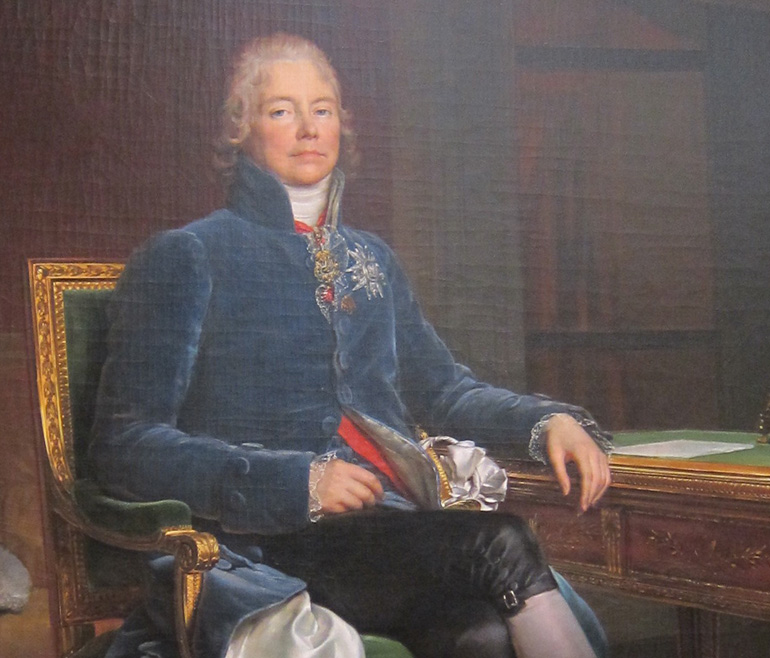Gotham Diary:
Opportunity
29 August 2013
Talleyrand was in his mid-fifties when François Gérard made this undoubtedly flattering portrait, in 1809. The former bishop and imperial diplomat, and future ringmaster of the Congress of Vienna, had momentarily retired from public life, and this picture illustrates what public life was the worse for losing. There he sits, surrounded by fine-looking things from the ancien régime, defying history itself: the old order would not be entirely swept away if he could help it. (He could and he did.) Disabled by an untreated clubfoot, Talleyrand was spared the military exercises that would have been a waste of his genius. It may also have freed him from the more unthinking habits of honor. Throughout his long life, Talleyrand exhibited the nimble opportunism of someone both rooted and wounded.
It is time to read up on Talleyrand again. I see that JF Bernard’s 1973 life, which I bought when it came out, has not been superseded. Opening the book at random, I came across this suave passage:
The American attitude toward wealth was as puzzling to Talleyrand as it would be to later generations of Europeans. His own interest in money was purely utilitarian: it served only to buy the things that pleased him: luxurious surroundings, books, paintings, fine clothing, presents for his friends. The idea that it might serve to purchase social standing was foreign to a man accustomed to a society in which position was inherited rather than bought and in which rank was an inalienable quality which had always, and would always, exist independently of the inventory of one’s material possessions.
Talleyrand’s American sojourn taught him that “the country has become acquainted with luxuries too soon. Luxuries are ridiculous when a man can hardly provide himself with the necessities.” This aperçu is illustrated by the contrast of a Sèvres table, purchased by an American “at the Trianon,” upon which someone had laid a hat so coarse that a “European peasant would not have been caught dead” wearing anything like it.
***
Rebecca Solnit’s meditation on intrusive media technologies and the corporations that foster them, in the current LRB, has been much on my mind, largely because it makes statements to which I already subscribe, but also because it suggests the nefarious possibility of an egalitarian tyranny in which each of us is reduced to the status of one customer. Solnit pulls an unlikely short story by Kurt Vonnegut out of her memory, and makes it pay.
A short story that comes back to me over and over again is Kurt Vonnegut’s ‘Harrison Bergeron’, or one small bit of it. Since all men and women aren’t exactly created equal, in this dystopian bit of science fiction a future America makes them equal by force: ballerinas wear weights so they won’t be more graceful than anyone else, and really smart people wear earpieces that produce bursts of noise every few minutes to interrupt their thought processes. They are ‘required by law to wear it at all times. It was tuned to a government transmitter. Every twenty seconds or so, the transmitter would send out some sharp noise to keep people like George from taking unfair advantage of their brains.’ For the smartest person in Vonnegut’s story, the radio transmitter isn’t enough: ‘Instead of a little ear radio for a mental handicap, he wore a tremendous pair of earphones, and spectacles with thick wavy lenses. The spectacles were intended to make him not only half blind, but to give him whanging headaches besides.’
What too few people — especially the necessarily inexperienced young — grasp is that the plethora of media choices is actually a constraint, because it presupposes the abandonment of personal initiative. By personal initiative I mean something as simple as the reading of a long novel. To read a long novel, you have to abandon the plethora of media choices, at least for several hours a week. Also, the young are especially afflicted with something not unlike a skin irritation that has recently found a perfect name: FOMO. Fear of missed opportunity. This fear is closely related, probabilistically, with the hope of winning the lottery. If you are always doing things that are either necessary or meaningful, then you will not be worrying about the things that you are not doing. It is doing nothing in particular, hanging out, being on the lookout for something to happen, that is like buying a lottery ticket and then spending the day watching television.
The gravamen of Solnit’s lament, I think, is that it is always going to be hard to make technology serve personal initiative instead of supplanting it. Making technology suit you, instead of letting yourself suit technology, requires a great deal of knowledge, and no small amount of wisdom. It will be of only limited use to know what your friends are doing, and how they are doing it. You need to know about how you do things, and about how your mind works. How anyone is to know such things, really for sure, before the age of forty is beyond me. And the corporations make what was is already hard even more difficult, by offering us so much stuff for “free” — subsidizing our consumption with advertisements, and deforming our networks with the need to sell things.
But: early days.

